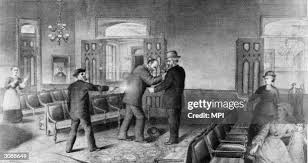
Introduction
James Garfield, the 20th President of the United States, serves as a significant figure in American history. His brief presidency, spanning only 199 days in 1881 before his assassination, presents a compelling narrative of a leader whose vision and dedication to reform still echoes through time. With contemporary issues of governance and leadership being examined today, Garfield’s commitment to education and civil rights resonates strongly, making his story relevant for modern audiences.
Early Life and Education
Born on November 19, 1831, in Moreland Hills, Ohio, Garfield rose from humble beginnings. His early life was marked by poverty, but he displayed a strong commitment to education, eventually earning degrees from Williams College in Massachusetts. Garfield was deeply influenced by the principles of the Enlightenment, which informed his views on democracy and governance. Before politics, he served as a teacher and joined the Union Army during the Civil War, where he distinguished himself as a general.
Political Career
Garfield’s political career began in the Ohio State Senate, and he was soon elected to the U.S. House of Representatives. His time in Congress was noted for his advocacy for post-war Reconstruction and civil rights for freed slaves. In 1880, he emerged as a compromise candidate for the Republican presidential nomination and won after a protracted battle against established party leaders.
Presidency and Assassination
Despite his brief time in office, Garfield pushed for significant reforms, particularly in civil service legislation, which aimed to reduce corruption in government employment. Unfortunately, on July 2, 1881, he was shot by Charles Guiteau, a disgruntled office seeker who felt entitled to a government position. Garfield succumbed to his injuries on September 19, 1881, making him the second U.S. president to be assassinated. His death sparked national outrage and a renewed push for civil service reform.
Conclusion
The legacy of James Garfield, though short-lived, reflects a commitment to the ideals of democracy, education, and reform. His life story illustrates the importance of perseverance and public service, qualities that continue to inspire future generations. As the United States navigates complex issues of governance and civil rights today, Garfield’s vision serves as a reminder of the ongoing struggle for a fair and just society. His impact on American politics and his relentless advocacy for equality remind us that every leader has the power to influence their nation profoundly.






